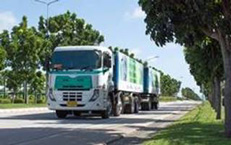PRA Chinese
Rubber Journal Asia Injection Moulding Asia Energy, Oil & Gas Asia
VISIT OUR OTHER SITES:
PRA Chinese
Rubber Journal Asia
Injection Moulding Asia
Energy, Oil & Gas Asia
Bio-based: Covestro’s resin for timber construction; Total Corbion’s PLA from Bonsucro-certified sugarcane

To reduce its dependency on fossil raw materials, Covestro is looking to manufacture a growing number of products and their associated precursors from renewable raw materials. Working with four partners, the company is aiming to develop bio-based reinforcing layers for solid wood construction materials to replace the petrochemical products used to date. The partners are Sortimo International, the German Institutes of Textile and Fibre Research Denkendorf (DITF), the Institute for Plastics Engineering (IKT) at the University of Stuttgart and the Fraunhofer Institute for Chemical Technology (ICT).
The polyurethane system, which is reinforced with cellulose fibress, is to be more than 90% bio-based, contain zero additives and exhibit excellent flame retardance and weathering resistance. The project is being supported by the German Federal Ministry of Food and Agriculture (BMEL) through the project sponsor, Fachagentur Nachwachsende Rohstoffe e.V. (Agency for Renewable Resources, FNR).
State-of-the-art solid timber construction techniques are increasingly coming to dominate our urban spaces. The main materials used to manufacture construction elements are cross-laminated timber and glued-laminated timber. Both materials consist of alternate layers of wood and thinly spread polyurethane resin. If aramid, glass or carbon fibres are embedded into the layers of resin, they create reinforcing segments that further enhance the stability of the construction elements.
Over the course of the recently launched project, the researchers want to find bio-based alternatives to the fossil-based resins and fibers that have been used to date. They are pursuing a combination of biogenous, aliphatic polyisocyanates and polyols based on vegetable oils. The resultant polyurethanes should exhibit low flammability and good weathering resistance, so that no special additives are needed to enhance either property.
When it comes to reinforcement, the scientists favour cellulose fibres such as those extracted from regenerated cellulose. “At the end of this process, we will have the first ever reinforcing materials for use in timber construction that are made up of at least 90% renewable raw materials,” says Dr. Paul Heinz from Covestro, who is coordinating the research project. This, he claims, will make state-of-the-art timber construction with cross-laminated and glued-laminated timber even more sustainable.
When it comes to manufacturing the construction elements, the project partners have opted for pultrusion, a continuous industrial production process for highly filled, continuous fibre-reinforced composite profiles. Pilot facilities run by the Fraunhofer Institute are being used to manufacture flat profiles for testing and optimising the necessary tools and process parameters.
During the project, Sortimo will produce an industry-standard model component that will then be used to evaluate the technical, economic and ecological potential of the new material and production process for the construction industry. Beech wood is being used for the component, as this material is becoming available in growing volumes due to forest restructuring.

Meanwhile, in other news, Dutch producer of PLA Total Corbion says that PLA resins from Bonsucro-certified sugarcane are now available for commercial order. This latest achievement allows converters and brand owners to use a certified PLA bioplastic that has been produced from sugarcane grown supporting the principles of sustainable agriculture.
Renewable feedstocks like sugarcane are used to produce lactic acid, which in turn is converted into PLA bioplastics.
 These bioplastic resins can then be used for a broad range of applications, such as packaging, consumer goods and automotive components. Mitr Phol, a local Thai sugar supplier, has been the first sugar producer in Thailand to achieve Bonsucro certification in July 2016. Following this milestone, Total Corbion PLA is now Bonsucro Chain of Custody certified and will offer a range of PLA resins in accordance with the certification scheme. These resins will be promoted within the existing, commercial Luminy PLA resin portfolio.
These bioplastic resins can then be used for a broad range of applications, such as packaging, consumer goods and automotive components. Mitr Phol, a local Thai sugar supplier, has been the first sugar producer in Thailand to achieve Bonsucro certification in July 2016. Following this milestone, Total Corbion PLA is now Bonsucro Chain of Custody certified and will offer a range of PLA resins in accordance with the certification scheme. These resins will be promoted within the existing, commercial Luminy PLA resin portfolio.

This new portfolio offering is the latest development under the company’s wider, continuous commitment to sustainable sourcing of raw materials. Total Corbion PLA’s position on feedstock sourcing for bioplastics is outlined in their whitepaper, published together with Corbion, which also includes the company stance on feedstock selection, land use, feedstock efficiency and food security. In conclusion, Total Corbion PLA states that ‘the concerns of using biobased feedstocks for plastics can be successfully identified and managed, and that the many benefits of these biobased, renewable feedstocks far outweigh their challenges’.
Furthermore, Corbion – from whom the lactic acid for PLA bioplastics production is sourced – has published its own sugarcane Code of Conduct to which all sugarcane suppliers must adhere.
(PRA)Copyright (c) 2017 www.plasticsandrubberasia.com. All rights reserved.























































